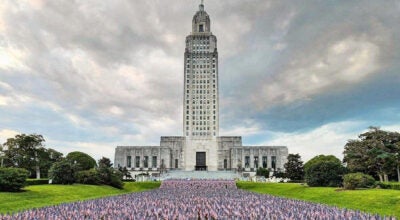Organ harvesting leads to bizarre lawsuit
Published 12:00 am Monday, April 17, 2006
LaPlace attorney takes on strangest case of his long career
By KEVIN CHIRI
Publisher
RESERVE — The possibility of diseased body parts being transplanted into otherwise healthy humans has led St. John Parish attorney Daniel Becnel Jr. to head up one of his most bizarre class action suits ever.
Becnel is already renowned throughout the country for heading class action suits against tobacco companies, drug companies and even the recent Hurricane Katrina-related suit against companies connected to the failure of New Orleans levees.
Becnel has released information to L’Observateur that he is now heading a class action suit against 10 companies, following revelations that body parts were unknowingly harvested from corpses at funeral homes, without approval of relatives.
“The worst thing about this is that the company doing the harvesting of the body parts, and then selling them for transplants, did no screening for diseases of any kind. There are now thousands of transplants which have occurred all around the country, and no one knows what the medical history of those parts entailed,” he said.
Becnel is one of three lead counsels in a new suit that names Biomedical Tissue Services, Ltd. (BTS) of New Jersey as the key player among eight companies which were involved, he said.
Biomedical Tissue Services allegedly worked with funeral homes to have body parts harvested from corpses, without approval of relatives. These parts included bones, corneas, skin and tendons which may have been contaminated with certain infectious diseases such as HIV, hepatitis, syphilis and other viral infections, the lawsuit says.
“This case could have an especially big problem in our area,” Becnel said, “since many of the hospital records
in the New Orleans area were lost in the hurricane. Not only do we not know who may have gotten these body parts, but we are having trouble even knowing who to contact.”
The other nine companies named in the lawsuit are those who distributed the parts. They are Regeneration Technologies, Inc.; Spinalgraft Technologies, LLC; Medtronic, Inc; Medtronic Sofamore Daniek, Inc.; Medtronic Sofamore Danek, USA, Inc.; Tutogen Medical, Inc.; Lifecell Corporation; Lost Mountain Tissue Bank; and Blood and Tissue Center of Central Texas.
The exact number of pieces distributed and used in operations is still uncertain, but news continues to be released that hospitals have contacted hundreds of patients who may have received tainted tissue.
BTS Owner Michael Mastromarino is one of four people who have been charged in the scheme that earned them millions of dollars. All have pleaded not guilty.
BTS supplied bone, skin and tendons to various companies, and those parts were then provided to distributors. None of those companies are accused of wrongdoing, but Becnel contends the liability is still theirs, along with BTS.
Medtronic, Inc., a Minnesota based company, has publicly acknowledged that at least 8,000 pieces that came from BTS were implanted.
Since the Food and Drug Administration has become involved in the case, all parts from BTS have been recalled, according to documents filed January in a federal lawsuit in Ohio.
While the FDA says the risk of infection is small, the lawsuit contends that the potential for damage to uninformed patients could be huge.
“Anyone who had a transplant with parts from BTS is at risk,” Becnel said. “This was such a horrendous situation since our information shows parts were harvested from dead people at funeral homes, and they even used PVC pipes to put back in their bodies for the bones they took out.”
The suit was filed on behalf of a woman who had a back operation, with pins put in her spine that included bone paste from BTS. The woman was later called back when doctors learned the parts may have been tainted. She is now subject to the potential of any disease that may have been in the bone paste.
The lawsuit says that companies receiving the parts still have a responsibility to screen those who the parts came from.
Those tests can include medical/social history evaluations for next of kin interviews, medical record evaluations, hospital record review, behavioral/lifestyle risk assessment, medical examiner/coroner’s report, and laboratory, pathology and radiology reports.
The FDA has not revealed if any patients receiving transplants has any ailments related to the suspect tissues, and they have also refused to reveal how many people received BTS tissue.
Medtronic did report that it acquired more than 13,000 pieces of BTS tissue from one processor, Regeneration Technologies, Inc., and of that number, 8,000 were implanted.
Regeneration and two other companies that process parts-LifeCell Corp. and Tutogen Medical Inc.-reported quarantining or destroying more than $5 million in BTS tissue.
David Wade, chief executive of Lost Mountain Tissue Bank, said it processed several thousand pieces obtained from BTS, but only a few hundred were distributed, and only about 20 pieces were transplanted, according to published reports.



